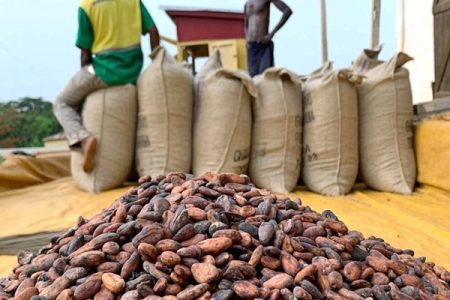International buyers of Ghana’s cocoa have made at least half a billion dollars of upfront payments to state marketing board COCOBOD, according to Reuters’ calculations, in a dash to secure supplies and avoid another season of heavy losses.
An abrupt overhaul of the three-decade-old marketing system in the world’s No.2 cocoa grower has thrust traders and processors into a vastly expanded role in financing and bringing in the crop.
Previously, COCOBOD would take on bank loans to buy farmers’ cocoa, then sell the contracts for the crop forward to international companies.
But after being financially hobbled by declining production and management decisions, the regulator for the first time since 1992 did not secure syndicated financing to purchase this season’s crop but instead is using the companies themselves.
COCOBOD says bypassing the banks will slash costs. But the shift also marks a new era of risk for private players, the cocoa sector in Ghana and the global chocolate industry.
“They’ve totally become dependent on private players to manage everything,” one small trader operating in Ghana said.
For now, the industry is on board, but further losses may see buyers turn elsewhere.
Failed harvests in top growers Ivory Coast and Ghana sent world cocoa prices to all-time highs in April while COCOBOD found it had vastly oversold and was unable to meet contracts.
Cocoa futures are again on the rise, promising to drive prices for holiday chocolates up further.
“There’s all the ingredients for bad things,” said a cocoa fund manager, pointing to concerns over the new marketing model, an uncertain crop outlook and next month’s election in Ghana, which could have major implications for the sector.
The fund manager, like most of the dozen other traders and sector players interviewed by Reuters, asked not to be named due to the sensitivity of commercial relationships in Ghana.
COCOBOD officials did not respond to a Reuters request for comment on its new marketing system and industry concerns over the current crop.
Reducing exposure
Traders are still owed up to 350,000 metric tons of cocoa for contracts from last season that COCOBOD failed to deliver, costing them at least $1 billion on their corresponding futures market hedges.
Though it disputes the 350,000 ton figure, COCOBOD has acknowledged contracts were rolled over and has told traders it will honour them this season.
That cocoa was pre-sold, however, at a fraction of current price levels. So to shield itself from losses and support farmer incomes, industry sources said COCOBOD is requiring traders to buy additional contracts at near-record high spot prices to even out the gaping price difference.
Companies have been left with little choice but to keep buying since, for every ton of cocoa they can source at the low prices of last season’s unexecuted contracts, they’re reducing their exposure.
“You know how much you’ve lost. You just don’t know how much more you might lose,” said the head of cocoa for one major trade house.
According to a Reuters calculation that two traders considered accurate, at current price levels, companies could lose another $2,500 on their hedges for every ton of last season’s cocoa contracts that remain undelivered.
To fill those contracts, COCOBOD is counting on a strong production rebound traders worry may not materialise.
“The financial risks are enormous in Ghana at the moment,” another trading company official said.
‘A huge gap to fill’
Until this season, COCOBOD’s main job was to purchase and market Ghana’s cocoa production.
It would secure a syndicated loan to finance the licensed buying companies (LBCs) that purchase beans from farmers and transport them to COCOBOD warehouses.
COCOBOD, which initially planned to again borrow up to $1.5 billion, announced in August just ahead of the new season that it would not tap the banks.
The decision will save $150 million in interest payments, it said.
In the place of bank financing, COCOBOD is requiring companies pay at least 60% of the value of their contracts upfront and pre-finance LBCs.
Several traders told Reuters that COCOBOD is delivering one ton of cocoa to fulfil last season’s unexecuted contracts for every ton companies purchase at this season’s spot prices.
Blending the old and new contracts likely makes the average price per ton around $5,000.
By the second week in November when season-to-date arrivals reached 183,000 tons, the advance payments would have added up to some $550 million. Much of that cocoa has yet to be shipped.
COCOBOD says the system is working. Farmers say they are getting paid. The view from the industry, however, is mixed.
Smaller traders say the new model exposes them to greater risk, forcing them to hand cash over to upcountry buyers they don’t know while advantaging big players with well-established supply chains.
More importantly, it only works while supplies last.
Evening out prices to cover all the roll-overs could require a harvest of roughly 900,000 tons, say analysts like Africa-focused commodities expert Tedd George.
That’s 250,000 tons more than COCOBOD’s own production estimate, which some in the industry already consider overly optimistic.
“It’s a huge gap to fill, which means some traders and local processors may not get their beans this season,” George said.
What happens if the beans run out remains a subject of speculation within the industry with some expecting Ghana will again roll contracts into next season.
Facing the prospect of booking those losses or again paying to move their hedges, at least some are starting to lose their appetite for Ghana’s cocoa.
“Trade houses are there because they made a loss and want to make it up,” said the small trader.
“But long-term, chocolate manufacturers are building ways to reduce their dependence on Ghana.”
Reuters
- Friday, May 9, 2025 Newspaper Headlines - 9 May 2025
- Adangabey brightens rural kids’ future from his wheelchair - 9 May 2025
- Stanbic donates ICT equipment to UHAS for digital learning - 9 May 2025

